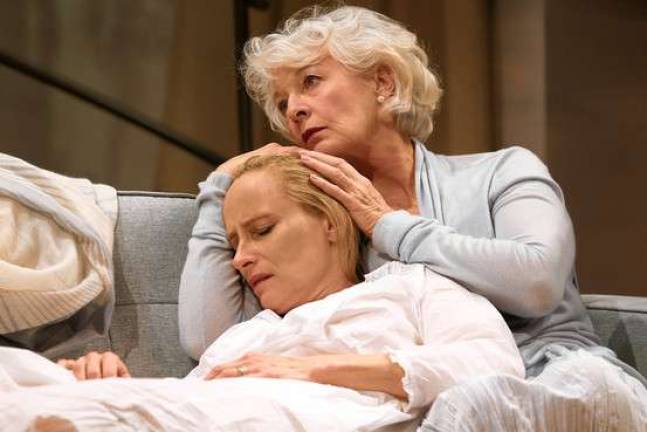Death Be Not Loud

A new revival of Albee's forgotten The Lady from Dubuque sheds light on the darkest of topics In his signature work, Edward Albee asked "Who's Afraid of Virginia Woolf?" In The Lady from Dubuque, which Signature is reviving following an abortive 1980 New York run, the playwright opens his show with the question "Who am I?" Various permutations of this question will be asked over the course of this deceptive show, and while plenty of meaty nuggets are to be found, don't expect any straightforward answers to that seemingly most basic of questions. Sam (a superb Michael Hayden) is the initial character to pose this question, as part of a parlor game he and wife Jo (Laila Robins) are hosting for four of their friends (Catherine Curtin, Thomas Jay Ryan, Tricia Paoluccio, and C. J. Wilson) in their impressive modern home (John Arnone's set decoration is gorgeous, somehow being both sterile and saliva-inducing). Jo is as gracious as she can be, given that she's enduring the painful symptoms terminal illness, which she tells the audience in one of many moments of Pirandellian direct address with which Albee peppers his play. The answer, as it were, to Sam's "Twenty Questions" riddle is deceiving ? he's not one person but two. But Lady brings even cloudier issues of identity to the surface once the silky Elizabeth (Jane Alexander) and her cohort, Oscar (Peter Francis James) let themselves in to the household once everyone else has left or retired to bed. Elizabeth purports to be Jo's mother, and though Sam insists she cannot be, that she bears no resemblance to his dying wife's actual mother, Jo offers no resistance. Though cloaked in white (Elizabeth Hope Clancy designed the costumes), Elizabeth seems to be none other than Death incarnate, and Jo accedes to her imminent demise in making friends with her, embracing (literally) a new family as she weans herself off of her existing one. One can see, perhaps, why Dubuque proved so confounding upon its original staging: it's evasive and elliptical, and some dialogue that Albee thinks is smart is actually rather silly. And the second act return of the two supporting couples feels clunky. But the playwright has bigger themes in mind, and in the hands of director David Esbjornson (who also directed the Tony-winning Broadway run of Albee's The Goat), the increasingly barbed, metaphysical flights of fancy feel instructive. There are life lessons here about who we are and what others do for us that should not be ignored. For instance, Sam loves Jo but can no longer help her; in fact, his mere touch only wounds his love as her body continues to punish and betray her. Esbjornson also conjures deep performances from his ensemble, particularly Paoluccio as the outsider of this incongruous group of friends and Wilson as its gruffest member. Alexander is exquisite, all the more unsettling because of her constantly calm demeanor. Depending on how one views the play, either Elizabeth, Jo or Sam will be its true lead (for me, it's Sam). And what's important is the answers given ? or lack thereof ? as much as the questions. Who is asking them, and why? What do we ultimately need from one another? The longer Jo cleaves to Elizabeth (for Robins, forced to writhe and moan, Dubuque must be quite an endurance run), the more we in the audience question what we look for in the company we hold near and dear. Kudos to the Signature's players and Esbjornson in particular. In resuscitating Dubuque, they have proven that a play about death has plenty of vital signs. Edward Albee's The Lady from Dubuque At the End Stage Theater in the Pershing Square Signature Center, 480 West 42nd Street, Clinton; thru April 15, signaturetheatre.org. $75.00